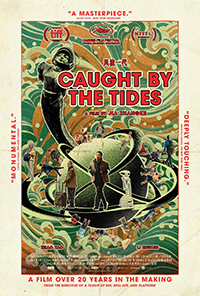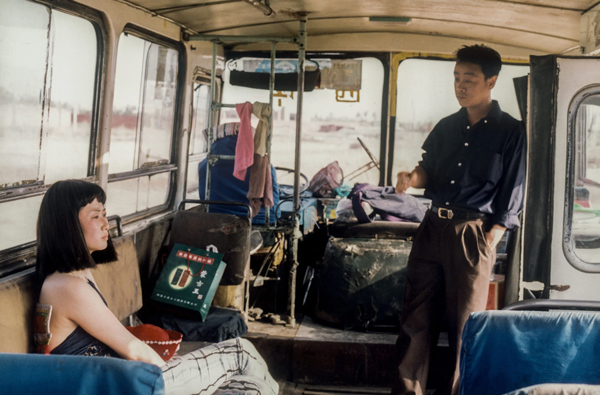The Tide is High: Zhangke Splices Thwarted Romance Across Changing Times
 Filmmaker Jia Zhangke presents something of an experimental anomaly with his latest feature, Caught by the Tides (Feng Liu Yi Dai), spanning two decades of shifting cultural climates and landscapes. Assembling footage shot across several periods beginning in 2001, Jia Zhangke transposes a quiet narrative within these archival moments for a uniquely cobbled hybrid. Jia Zhangke’s wife, Zhao Tao, who has appeared in a majority of his narratives since 2000’s Platform, remains the vibrant highlight as a mute, melancholic woman fashioned like a figure from silent cinema. A changing industrial landscape assists in corroding a relationship both partners will attempt to reclaim at one point or another, but it would seem never when it’s convenient for both at the same time.
Filmmaker Jia Zhangke presents something of an experimental anomaly with his latest feature, Caught by the Tides (Feng Liu Yi Dai), spanning two decades of shifting cultural climates and landscapes. Assembling footage shot across several periods beginning in 2001, Jia Zhangke transposes a quiet narrative within these archival moments for a uniquely cobbled hybrid. Jia Zhangke’s wife, Zhao Tao, who has appeared in a majority of his narratives since 2000’s Platform, remains the vibrant highlight as a mute, melancholic woman fashioned like a figure from silent cinema. A changing industrial landscape assists in corroding a relationship both partners will attempt to reclaim at one point or another, but it would seem never when it’s convenient for both at the same time.
In Datong City in northern China, the beginning of the 21st century appears to be a period of frivolity and possibility. A group of women celebrate Women’s Day, and the coal-mining industry has not yet diminished. Still, there are those keen on preserving remnants of the past, such as a man who has pulled a large portrait of Chairman Mao out of the rubbish pile to remount in the Workers’ Cultural Palace. The city’s night life is rife with neon lit entertainment, and a woman named Qiaoqiao (Tao) parties non-stop with her boyfriend, Brother Bin (Zhubin Li). Eventually, he also serves as her manager as she models clothes for an outdoor department store runway and performs at public functions, such as a celebration for the announcement of the Beijing Olympics. But this fast-paced, flashy life has its limitations in Datong, and Bin breaks it off with Qiaoqiao via text, announcing he will send for her when he gets settled elsewhere.

Five years later, Qiaoqiao books a passage on a cruise ship to Fenjie City, where she happens to know Bin has relocated, working now for a real estate developer having financial issues. The construction of the Three Gorges Dam (which served as the backdrop for Jia Zhangke’s celebrated 2006 title Still Life) finds the region, and Bin’s participation in it, as an area undergoing a significant transition. He won’t respond to her texts or calls, so she puts out a missing bulletin announcement on the local news station. His begrudging response, at last, confirms their relationship is over.
Sixteen years later, in the waning days of the COVID-19 pandemic, Bin travels to Zhuhai City to meet with relatives after being laid off at a defunct loan servicing company. Making his way back to Datong City, he has a chance encounter with Qiaoqiao, and he attempts to rekindle a correspondence.
For a majority of its running time, Caught by the Tides feels like a novel time capsule of Jia Zhangke’s assembled footage, the narrative portion sometimes feeling like an afterthought. Fans of Tao’s unique brand of self-satisfied confidence should appreciate the film’s early segments, where she transforms into a haughty ingenue at the top of her game. However, when Bin decides to leave, she becomes a melancholic shell, something nearly everyone notices about her during ensuing encounters, including a man offering to read her fortune, and, in the film’s best scene, a playful encounter with a department store customer service robot.
The first two segments have a detached energy, wherein the documentary and narrative footage don’t quite feel homogenous. By the third act set in 2022, Caught by the Tides suddenly transforms into its own peculiar brand of energy, made possibly only through the distilled passages preceding it. As Qiaoqiao and Bin observe a live musical performance with lyrics which seem to speak directly to their predicament, the finality of her silence finally seems to set in. During the final scene’s sole moment of vocal release, there’s a triumph in this sadness, signifying a release from the metaphorical predicament of the title.
Reviewed on May 18th at the 2024 Cannes Film Festival – Competition. 111 Mins.
★★★½/☆☆☆☆☆


